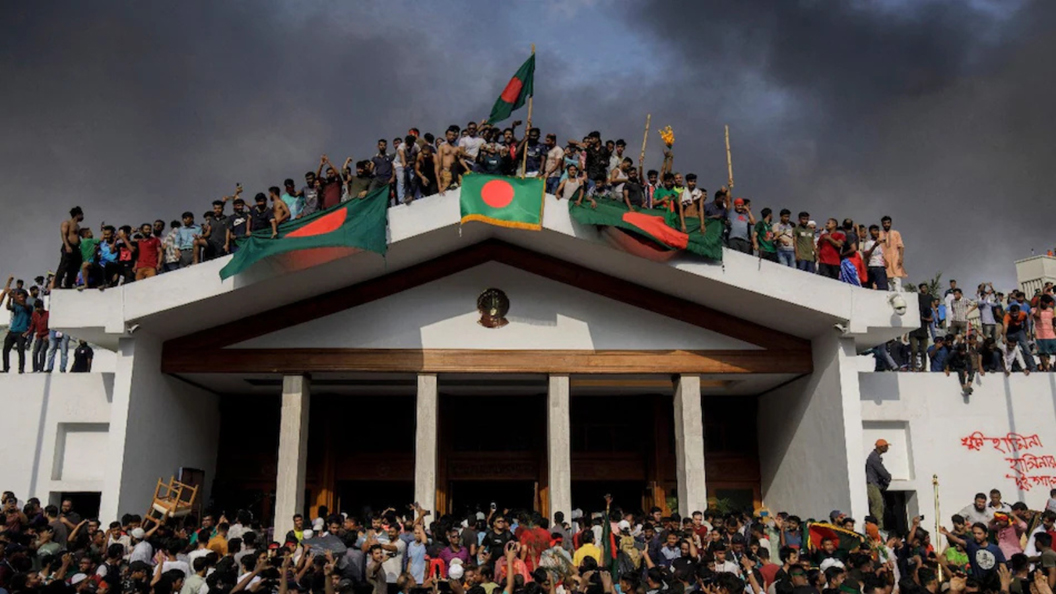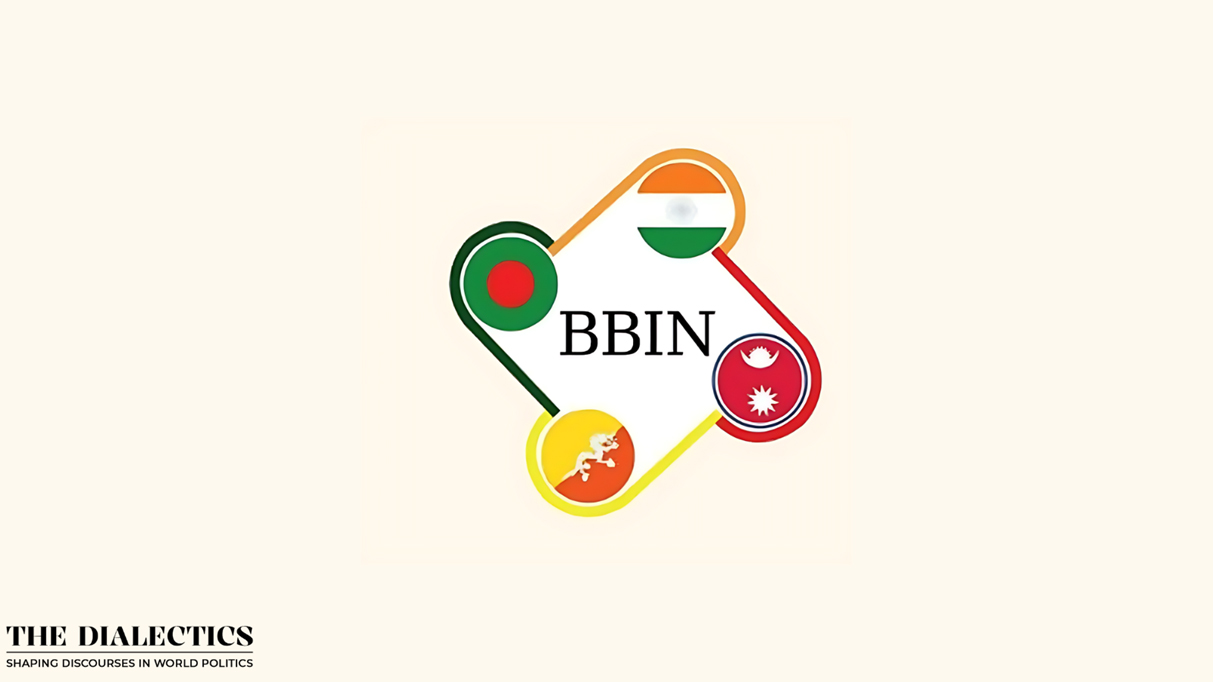Introduction
Since the formation of the interim government in Bangladesh in early 2024, the country has been grappling with economic and political challenges that have significant implications for its foreign policy. The transition has been marked by heightened political tensions, economic instability, and increasing diplomatic maneuvering as Bangladesh navigates its domestic and international obligations. This paper examines the economic and political landscape of Bangladesh under the interim government and assesses how these developments influence the country’s foreign relations.
Economic Landscape
Following the establishment of Bangladesh’s interim government in August 2024, the country has faced severe economic challenges. Inflation hit a 13-year high of 11.66% in July 2024, fueling public discontent. The central bank projects GDP growth of 5-6% for FY 2024-25, slowed by political instability, inflation, and recent floods. Meanwhile, the taka depreciated by 12.72% against the US dollar in 2024 due to a stronger dollar and domestic pressures.
In response, the government sought international support. In December 2024, it requested additional funding from the IMF, while the US pledged support for economic and institutional development. The IMF, World Bank, and ADB announced further financial aid, though more support is needed.
Under Sheikh Hasina’s government, the IMF disbursed $1.15 billion as part of a $4.7 billion loan program approved in January 2023. However, the interim government faces stricter IMF conditions, including subsidy cuts and exchange rate adjustments.
Despite economic struggles, Bangladesh’s RMG industry showed resilience. In 2024, exports rose 7.23% to $38.48 billion, with the EU accounting for 50.34% of the total at $19.37 billion. However, exports to the US declined, and political unrest led to order cancellations and production shifts. Looking ahead, the RMG sector remains optimistic, expecting a global market recovery in 2025 with Western buyers returning as inflation eases. In response to currency depreciation, Bangladesh Bank allowed flexible forex transactions to stabilize the taka.
Despite ongoing challenges—currency depreciation, inflation, and political uncertainty—the RMG industry remains Bangladesh’s economic backbone, driving exports amid adversity.
Political Landscape
In Bangladesh, the interim government was formed on August 8, 2024 under Nobel laureate Muhammad Yunus on August 8, 2024, the country went through significant political shifts. This interim government was the result of widespread student-led protests against a controversial job quota system, which escalated and led to the resignation of for almost 15 years.
Due to the nation’s pressing challenges there were several Reform Commissions were formed, notably, the Constitutional Reform Commission, established under Ali Riaz, to draft a new and inclusive constitution that upholds the democratic principles and human dignity. In January 2025, the commission submitted its report, recommending that the Current state ideals of nationalism, socialism and secularism should be replaced and the preamble should emphasize on equality, human dignity, social justice, and pluralism. It also proposed the establishment of a bicameral parliament to ensure greater representation.
Despite these reformative efforts, the country has witnessed a surge in violence against religious minorities, particularly the Hindu community, who have historically been supporters of the ousted Awami League. Reports suggest that there were numerous attacks on Hindu households, temples, and businesses following Hasina’s departure. The interim government has expressed grave concern on these attacks and pledged to address and resolve these issues, together with the representative bodies.
Concurrently, the political parties notably, notably the Bangladesh Nationalist Party (BNP), push for expedited elections has also led to the increased political tension in the country. The BNP is emphasizing on the need for speedy return of Democratic government and has been pressing for elections to be held as early as August 2025. In order to bring political normalization and fundamental reforms in the country, the interim government has indicated plans to hold general elections by December 2025.
In a landmark ruling, the High Court cleared all 47 people previously found guilty in a case involving an attack on a train carrying Sheikh Hasina, the opposition leader at the time, in 1994. This ruling has been interpreted as a step toward judicial independence and a reexamination of politically charged cases from previous administrations. The International Crimes Tribunal has also issued arrest warrants against former Prime Minister and other officials for alleged genocide and crimes against humanity. Homeadvisor Lt Gen (retd.) Md Jahangir Alam Chowdhury stated that active diplomatic efforts have started to bring back those under trial including the former Prime Minister.
Impact on Foreign Policy
In the wake of political upheaval, the interim government has aggressively pursued U.S. support for national reconstruction. Just within a month of taking office, Chief Adviser Yunus has reached a deal of $200 million USAID as a support in economic and political reforms. This signifies a strategic shift towards strengthening U.S.-Bangladesh relations. It will also help secure advantageous terms from creditors of international platforms and reduce its reliance on opaque agreements.
China has welcomed the interim government and strengthened its ties by extending economic and diplomatic support to Bangladesh. In January 2025, Foreign Affairs Adviser Touhid Hossain’s five-day visit to China, reaffirmed Bangladesh’s commitment to bilateral cooperation. China has also invested $210 million in Bangladesh. China has also promised a 1 billion yuan grantfor various developmental projects in the country.
The interim government in Bangladesh has expressed its commitment to maintain “smooth and friendly” relations with all nations, including India. Foreign Affairs Adviser Md Touhid Hossain underlined the significance of advancing Dhaka-Delhi ties to reflect upon the cordial historical relation between the two nations. This approach aims to balance historical ties while also addressing domestic sentiments.
However the diplomatic relations between the two nations had become complicated as a result of the overthrow of former Bangladesh Prime Minister Sheikh Hasina in August 2024 and her subsequent asylum in India. The departure of Sheikh Hasina from Bangladesh which was prompted by mass protests and political upheaval and declined asylum requests in countries such as the United Kingdom led her to seek temporary shelter in India.
In summary, Bangladesh’s interim government is recalibrating its foreign policy to foster balanced and positive relations with key global players, aiming to rebuild the nation’s economy and assert its sovereignty in international affairs.
Conclusion
The period following the establishment of the interim government in Bangladesh has been marked by economic and political turbulence, affecting the country’s foreign policy direction. While the government has sought to stabilize the economy through international financial assistance, challenges such as inflation, declining exports, and governance issues persist. Politically, the lack of electoral credibility and suppression of opposition voices have raised concerns domestically and internationally. Moving forward, Bangladesh’s ability to navigate these challenges will be crucial in determining its economic stability, democratic governance, and diplomatic positioning in the global arena.




